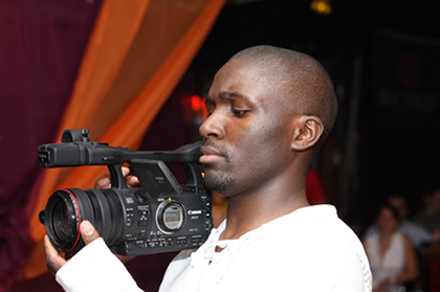Social Networking with African Journalists
Dick Scherpenzeel Stichting
Wednesday September 16th
Location: De Balie, Amsterdam
In the smallest room in the Balie, the Dick Scherpenzeel stichting, in cooperation with a handful of donors, held a debate on the opportunities of new media to link local African reporters with western media. Can Twitter, Facebook, linkedin, Blogs and broadband connections change the face of international correspondence? This was the question that drew a healthy amount of people to the debate in the Balie in Amsterdam. Unfortunately the answers had no prominence in the debate. Only once Facebook was mentioned and the other new media opportunities were left untouched. Most of the time was spend discussing a wider debate on the ethics of journalism.
The necessary panel of speakers made their  appearance and told us what we already knew. New media makes international communication easier. The discussion soon revolved around the question: are African reporters good enough to cover a story for Dutch media? Is anybody with a camera-phone a journalist? And, are the stories of African reporters relevant for a Dutch audience? In a battle of old vs. new media, Africa interactive chairman Pieter van Twisk defended his network of semi-professional African reporters against the more traditionally oriented Bart Luirink, editor in chief of ZAM magazine.
appearance and told us what we already knew. New media makes international communication easier. The discussion soon revolved around the question: are African reporters good enough to cover a story for Dutch media? Is anybody with a camera-phone a journalist? And, are the stories of African reporters relevant for a Dutch audience? In a battle of old vs. new media, Africa interactive chairman Pieter van Twisk defended his network of semi-professional African reporters against the more traditionally oriented Bart Luirink, editor in chief of ZAM magazine.
Trough a skype connection we were informed by Dutch Journalist Aernout Zevenbergen, who is based in South Africa, that his cooperation with local reporters did not add value to the stories he wrote. Most local African journalist are too detailed for the Dutch audience, furthermore, because of the inherent structures in most African nations, local journalist often hesitate to ask questions that could jeopardize their position. Brechtje van de Moosdijk of RTL added that, as an established media outlet, RTL uses only one Dutch correspondent in Africa who will be ‘the face to trust’ for the Dutch audience. Overall; the Dutch ‘professionals’ saw African reporters convenient as stringers or source of background information. However there seems to be no direct plans to outsource the job of ‘reporter’ to African journalists.
Another problem with local reporters is their credibility and the risk for Dutch media outlets to unintentionally support activists who have other aims than giving the whole story objectively and in a journalistically sound way. Stan van Engelen of VPRO’s Metropolis TV has a lot of contact with the local reporters he works with around the globe; however, to verify if a story is genuine and in accordance with basic rules of journalism proves to be difficult. In a video clip from Pakistan on ‘dating culture’ he exemplified this claim. The local reporter staged an encounter with the police harassing a young couple walking hand in hand. Metropolis almost fell for the trickery which proves the risk of using ‘others’ to tell a story on a respected platform.
In the last 20 minutes of the debate, somebody finally set the conversation back on the ground by remarking that the issues discussed had less to do with African reporters and web 2.0 than with ordinary journalism. The audience was left wondering what happened to more interesting new media developments in African such as Ushahidi, Frontline SMS, Twitter and the African blogosphere. There seemed to be too many established stakeholders in the panel to leave space for all the opportunities of the internet and newsgathering in Africa.